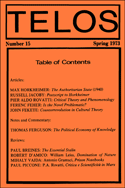In an incisive and thoughtful review essay in Quadrant (March 2015), Peter Murphy examines Joel Kotkin’s The New Class Conflict and the prognosis for America in the “post-creative economy.” Read the full essay (subscription required) at Quadrant Online. Purchase your copy of The New Class Conflict in our online store.
|
Here are just a few of the photos we took at last weekend’s Telos Conference in New York City. By all accounts the conference was a tremendous success, filled with lively conversation, thoughtful debate, delicious food, and our usual dose of February snow. We will be posting more media and writing from the conference shortly, so stay tuned! The recent protests of the deaths of Michael Brown in Ferguson, Missouri, and Eric Garner in New York City, both black males, at the hands of police, ignited what some believe to be a new movement in the vein of the historic black Civil Rights Movement of the 1960s. Little did Messrs. Brown and Garner know that their tragic deaths would breathe new life into a near-dead progressive Left. New groupings of Gen Xers and Millennials, networking through the Internet, have now displaced older activist groups led by the Rev. Jesse Jackson and the Rev. Al Sharpton. Other groups, like organized labor (especially SEIU), and perennial malcontents of Marxian legacy, such as the ANSWER coalition and the Revolutionary Communist Party, USA, have appeared in protests, alongside shadowy cadres of white anarchists, who in some cities have thrown firebombs and damaged property during protest actions. Unlike Occupy Wall Street and its derivatives, the new protest groups have an identifiable leadership, appear regularly in news media, and are building the road as they travel, that is, working out tactics and strategies based on their reading (or misreading) of past protest movements, as they go. Writing at the Gatestone Institute website, Amir Taheri reviews Matthias Küntzel’s Germany and Iran: From the Aryan Axis to the Nuclear Threshold, available now from Telos Press Publishing:
|
||||
|
Telos Press Publishing · PO Box 811 · Candor, NY 13743 · Phone: 212-228-6479 Privacy Policy · Data Protection Copyright © 2025 Telos Press Publishing · All Rights Reserved |
||||
 In November 1939, gangs of German civilians and Nazi operatives stormed Jewish stores, synagogues, and homes, killing or arresting those who could not escape. The Nazi leadership had carefully planned the assault—Kristallnacht would become only one among many instances of unimaginable horror. In the coming years, the Nazis proceeded to murder thousands of disabled Germans; when Germany invaded Russia, groups of special units—known as Einsatzgruppen—followed closely behind the German army, liquidating Jews, Communists, and Roma.[1] By 1942, the Nazi death camps had initiated yet another gruesome and terrifying phase of the Reich’s program of anti-Semitism and racial purity.[2]
In November 1939, gangs of German civilians and Nazi operatives stormed Jewish stores, synagogues, and homes, killing or arresting those who could not escape. The Nazi leadership had carefully planned the assault—Kristallnacht would become only one among many instances of unimaginable horror. In the coming years, the Nazis proceeded to murder thousands of disabled Germans; when Germany invaded Russia, groups of special units—known as Einsatzgruppen—followed closely behind the German army, liquidating Jews, Communists, and Roma.[1] By 1942, the Nazi death camps had initiated yet another gruesome and terrifying phase of the Reich’s program of anti-Semitism and racial purity.[2]  In his essay “Political Aesthetics: Carl Schmitt on Hamlet,” David Pan puts forward an interpretation of the relationship between aesthetics and politics in Schmitt’s discussion of Hamlet. Today the question about the relationship of aesthetics and politics in the thought of German jurist is a widely discussed topic. According to one interpretation, which is best represented by a sentence of Jürgen Habermas, “Carl Schmitt’s polemical discussion of political Romanticism conceals the aestheticizing oscillations of his own political thought.” But according to Schmitt’s self-understanding, this interpretation could not be further from the truth.
In his essay “Political Aesthetics: Carl Schmitt on Hamlet,” David Pan puts forward an interpretation of the relationship between aesthetics and politics in Schmitt’s discussion of Hamlet. Today the question about the relationship of aesthetics and politics in the thought of German jurist is a widely discussed topic. According to one interpretation, which is best represented by a sentence of Jürgen Habermas, “Carl Schmitt’s polemical discussion of political Romanticism conceals the aestheticizing oscillations of his own political thought.” But according to Schmitt’s self-understanding, this interpretation could not be further from the truth. 

